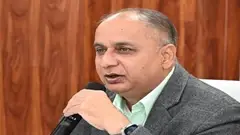
Riding on strong growth trajectory, RBL Bank aims to provide holistic services to farmers and rural customers with Value Chain approach.
RBL Bank is one of India’s fastest growing banks serving over 14 lakh customers through its 183 branches; and has delivereda stong growth performance in FY 14-15. One of the notable factors responsible for the Bank’s growth has been significant growth in “Priority Sector Lending Business”. The Bank has achieved all its Priority Sector Lending as well as all sub-sector targets for three years in a row including FY15. During FY 14-15 the Bank’s priority sector lending was seen at 47.86% as against mandated 40%. The bank has been honored as Best Bank Priority Sector Lending (Private Sector) at Dun & Bradstreet Banking Awards and as a Global Growth Company by the World Economic Forum in 2014. RBL Bank has also been recognised as India’s Fastest Growing Mid- Sized Bank for three years in a row by Business Today – KPMG India’s Best Bank Study.
Speaking to Krishi Jagran, Manoj Rawat, Head of Agribusiness at RBL Bank says, “Agriculture, Rural Banking and Financial Inclusion will be next driver of growth for Indian banking Industry. An inclusive banking system has become a top priority to drive growth in the country and also to address the two key areas of concern namely, Financial Inclusion and Food Security. These two areas are ‘intertwined’ and are set to drive the next phase of economic growth of the country which will be alot more participative, broad based & inclusive.”
What are the emerging opportunities for banks in Rural India?
A quiet yet sound revolution is taking place in rural India where economic growth is not just about creating wealth but also offering huge opportunities for banks to service the financially excluded. Today Rural Banking is being seen as a huge opportunity,with rural financial services beingone of the fastest growing segments.
It is being increasingly recognized that Rural Business, Agriculture Business, Food Security, Financial Inclusion and MSME are serious business opportunities which can help develop a robust Rural Business model. The basket of products that Rural India requires will be far more wholesome than of Urban India. The various segments which are going to see the next big growth opportunity include Agribusiness, MSME, Rural Housing, Renewable Energy and Services.
What is the significance of Agriculture in the Indian economy?
Agriculture sector remains the mainstay of the Indian economy (although it contributes about 14% of the national Gross Domestic Product (GDP)) as 60% of Indian families are still dependent on agricultural income for livelihood. India today is the largest producer of milk, pulses and spices. The country alsomaintains the largest cattle herd and covers the largest area under wheat, rice and cotton. While agriculture share in India’s economy has continued to decline due to the high growth rates of the industrial and services sectors, the agriculture sector’s importance in India’s economic and social well-being goes well beyond this indicator.
What is the approach of RBL Bank towards Agriculture and Rural Banking?
Agribusiness credit is the most critical non-land input in agriculture and has played a pivotal role in increasing agricultural production in India.
Although Agri-credit has its own statutory significance and generates a strong goodwill with the Regulator and Government, at RBL Bankweapproach this as a huge business “opportunity” rather than an “obligation”. We believe Rural & Agriculture business offers huge business potential and can generate sustainable economic value to the Bank, farmers, customers and our other stakeholders. At RBL Bank we have identified Agribusiness and Rural banking as one of the key areas for growth, and a driver for expansion of branch networks in Semi-Urban and Rural India.
The Bank adopts a five-pronged approach to increase its relevance in Rural India
- Focus on direct farmer banking requirements
- Develop innovative products and market specific schemes for farmers and rural customers
- Tap the entire value chainincluding farmers, artisans and other players inthe different catchments
- Increase outreach through expansion of institutional network and use of technology
- Work with farmers and corporates to forge both forward and backward linkages
How have you modelled your Agriculture business?
The Agribusiness for our bank has been modelled to address the different target markets in a focussed manner across the value chain.
- Retail Agribusiness:The Bank is leveraging on the strength of its existing branch network and also some new branchesthat are being rolled out, to expand and grow its Agribusiness portfolio. Besides historical branches, which have rich Agribusiness potential, many new branches have been identified which offer large Agribusiness potential in Retail and Commodity business. Banks offer Smart ATM-cum-Debit Card on Rupay Platform to its farmers under “Kisan Credit Card” Scheme. Retail Agribusiness has become one of the major thrust areas for banks.
- Wholesale Agribusiness & Value Chain Finance: The wholesale Agribusiness and Value Chain Finance forms an important segment of Agribusiness which addresses the key corporate and institutional relationships in agricultural sector to enable bulk farmer funding deals. It works with Sugar factories, Dairies, Plantation companies, Agro-processing industries, Agri-input companies etc.
- Commodity Finance and Pledge Finance: Commodity Finance and Pledge Finance to farmers against hypothecation of agricultural produce (including warehouse receipts) has been identified as another segment for growth of Agribusiness. RBLBank has already launched Warehouse Receipt Financingprogram, wherein credit facilities are being extended to farmers, processors and grader sorters, primarily based on the underlying asset i.e. Agri-commodities. Our Bank offers commodity finance for both perishable and non-perishable commodities.
RBL Bank has been offering products to its farmers and rural customers for Renewable Energy, Micro-Irrigation, Hi-tech cultivation, Agri-warehousing and Agri-marketing Infrastructure.Ourbank is working with various innovative projects namely, Model villages, Better Water Management initiatives, Improved Cattle Management program, Livelihood enhancement projects and Farm mechanization.
What is key to deliver agriculture credit to farmers?
The flow of credit to agriculture has increased significantly in the recenttimes. This year the institutional agriculture target is more than Rs. 8 Lakh Crores.Although the amount of agricultural credit has increased substantially, during the last few years, the access to formal sources of credit has been inadequate for small and marginal farmers (who constitute for more than 80% of the farming community). Banks have to come up with innovative products to address the credit and banking needs of smaller farmers. Our bank has a special focus on small and marginal farmers and has developed innovative products which cater to the needs of these smaller segments. We are using our Bank’s outreach program and technology frameworks to address the banking needs of smaller customers. It has been our endeavor to offer a comprehensive suite of short term & long term financial products to famers inorder to give them a wholesome, affordable and efficient banking experience.
What kind of framework is needed to increase banking outreach to the last mile in the country?
The Financial Inclusion initiatives of the Government and Regulator to provide access to banking services at all villages through Branches, Ultra Small Branches, Mobile Banking, ATM or Kiosks or Business Correspondents at an affordable cost is going to change the banking landscape in India. Banks are gearing up by upgrading the technology infrastructure to include core banking solutions, mobile and internet banking, Mobile ATMs, Smart Cards with the objective to reduce the cost of transactions, improve customer experience and build a competitive edge for themselves.
However, the sustainable success of the “Financial Inclusion and Deepening” initiatives will be achievedbyadopting an approach wherein all stakeholders work on this “Commercially viable proposition & Value Creation opportunity” rather than only a Government or Regulator driven mandate..
For banks the challenges do remain but the willingness to move from an “obligatory” to “opportunity” approach, from “Class” to “Mass” banking and from “Exclusive” to “Inclusive” strategy will remain key.Bankswill need to work “High Volume” business with technology and innovationasthe key drivers. The various initiatives of the policy makers, regulator and banks in this direction isgoing to transform Rural India and pave the way to achieve “true & lasting financial inclusion” and would also contribute to creatingsustainable food and nutritional security for the country. At RBL Bank we see “Rural” as the next big opportunityas wework towards becoming one of theadmired leaders in this segment.















Share your comments